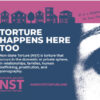
KJIPUKTUK (Halifax) – Last month the department of Community Services told Income Assistance recipients who qualify that they must apply for the Canada Emergency Response Benefit (CERB).
We are hearing that this decision has raised many questions and quite a bit of anxiety.
The federal government will pay those people on Income Assistance who lost earned income as a direct result of the COVID-19 pandemic and who made more than $5000 over the last year $500 per week for a maximum of 16 weeks. During that time they will not receive income assistance.
You have to apply for CERB if you qualify, it’s not like you have a choice. And while on CERB you will lose your income assistance support. But for the time being you will be much better off. $500 a week is a lot more than the measly $508 to $862 per month Community Services forks out for an able-bodied individual.
Meanwhile Community Services stands to save money.
Many questions, few answers
Some of the questions people raise deal with income taxes owed on the CERB payments, others are about how much money you are allowed to save to pay for the tax.
Right from the start Community Services has not been very helpful as people try to understand the change.
As my colleague Kendall Worth reported, people who potentially qualify for CERB started receiving calls from caseworkers who told them to apply for CERB in early April. But they were not told whether the benefit would be clawed back partially or even entirely, or what would happen when the CERB ends. This caused a lot of needless anxiety and confusion.
See also: Some social assistance recipients qualify for CERB payments
We now know that you do get to keep the full amount, but other questions remain.
Don’t bother looking for answers on the Community Services web page, there is nothing.
Thankfully, one really good place to look for answers is in a brochure put together by Dalhousie Legal Aid. It contains a lot of very useful basic information tailor made for Income Assistance recipients.
Taxes and assets
Kendall reports that something that concerns income assistance recipients who qualify for CERB is how much tax they are going to owe on the CERB payments. Rumors like “you better put $300 to $600 out of every check away” are making the rounds, he notes.
You do have to pay tax on any amount above the first $12,000 you earn, and CERB, unlike Income Assistance, is considered income. How much you end up paying will differ from person to person.
What makes things harder, Kendall suggests, is that advocates who support low income people in more normal times are much harder to reach, given social distancing and so on. The same applies to people who help you with your income tax and understand those things.
“Many income assistance recipients who qualify for CERB are saying “Paying a large amount back in taxes at tax time or whenever it happens is going to be all new to us,” writes Kendall. “Rumours circulating in the community has them scared.
The other big question among people he talks with is what will happen when CERB ends and people need to return to Income Assistance. What will happen with the money they may have saved?
“You are required, as part of what happens at your annual review, to show your bank statements and prove that you do not have over a certain amount of money put away in an asset,” Kendall writes.
“When CERB ends or their situation changes, we’ll ensure a smooth transition back onto IA for those clients who need it, a Community Services spokesperson told us when we asked in April.
But when we followed up earlier this week DCS confirmed that does not include a change in the amount of money you are allowed to have saved.
“Clients can have allowable assets, including savings, of up to $2,000 for an individual, or $4,000 for a family, before income assistance is impacted,” writes Lynette MacLeod on behalf of the department. That’s the same amount as always.
When your income doubles, and you know it’s only for a short time, of course you want to try to put away as much as possible, especially when you know you will have to pay income tax on that amount. However, as far as DCS is concerned there are limits to what you are allowed to save.
So now we have people trying to put some money away, not just for rainy days but also for possible income tax payments, but that same money would be considered an asset that is taken into account when you apply for a return to Income Assistance!
It’s all very confusing.
Kendall Worth is an award-winning anti-poverty activist who lives with disabilities and tries to make ends meet on income assistance.
With a special thanks to our generous donors who make publication of the Nova Scotia Advocate possible.
Subscribe to the Nova Scotia Advocate weekly digest and never miss an article again. It’s free!




If there is any possibility that DSC can make someone else foot the bill, in this case, the federal government, they pounce on it like a rabid animal, hence the misery they are causing by their unpreparedness.
““Clients can have allowable assets, including savings, of up to $2,000 for an individual, or $4,000 for a family, before income assistance is impacted,” writes Lynette MacLeod on behalf of the department.” I thought that only applied to those who get ESIA for reasons of disability, not those seeking work or working part-time. When I first applied for assistance 30 years ago (back then it was municipal income assistance, not provincial), I had to show that I had less than $2 in my bank account. After extreme poverty destroyed my health, I was switched over to provincial Family Benefits (disability) a few years later. Then I was off it for three months when I attempted to work but was too sick. When I applied for Family Benefits again (1996), the caseworker told me I had to live off the $500 in my bank account first. I told him I knew I was allowed to have $500 if I was applying for reasons of disability. He checked and found out this was true.
“That’s the same amount as always.” When Family Benefits became ESIA, I was told by each of my many caseworkers that I could have $1000 in savings. Since I’ll never have $2000, it doesn’t matter when it was increased to $2000 or if a dozen caseworkers didn’t know it always was $2000.
Very confusing indeed and the $50 per person that the NS government gave out along with the GST top up once every 3 months feels more like a slap in the face to me as i truly believe we do not get near enough to live on tn the first place,thank you for all your hard work kendall keep it going!!
That extra GST amount is a one-time payment. We won’t get it every three months.
Welfair is a trap and death is the only release, I hate this life…
double dipping is allowed with the sask. health authority only you get a pension and keep working for a salary ?
Are they allowed to
Take ur assurance
Away for
Good if u collects cerb because you thought u qualified!???